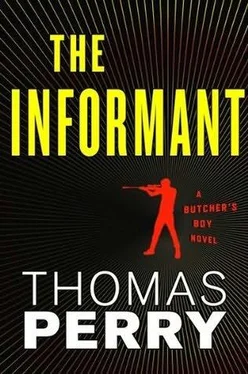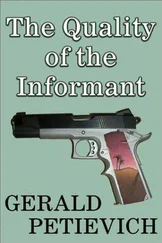Thomas Perry - The Informant
Здесь есть возможность читать онлайн «Thomas Perry - The Informant» весь текст электронной книги совершенно бесплатно (целиком полную версию без сокращений). В некоторых случаях можно слушать аудио, скачать через торрент в формате fb2 и присутствует краткое содержание. Жанр: Триллер, на английском языке. Описание произведения, (предисловие) а так же отзывы посетителей доступны на портале библиотеки ЛибКат.
- Название:The Informant
- Автор:
- Жанр:
- Год:неизвестен
- ISBN:нет данных
- Рейтинг книги:5 / 5. Голосов: 1
-
Избранное:Добавить в избранное
- Отзывы:
-
Ваша оценка:
- 100
- 1
- 2
- 3
- 4
- 5
The Informant: краткое содержание, описание и аннотация
Предлагаем к чтению аннотацию, описание, краткое содержание или предисловие (зависит от того, что написал сам автор книги «The Informant»). Если вы не нашли необходимую информацию о книге — напишите в комментариях, мы постараемся отыскать её.
The Informant — читать онлайн бесплатно полную книгу (весь текст) целиком
Ниже представлен текст книги, разбитый по страницам. Система сохранения места последней прочитанной страницы, позволяет с удобством читать онлайн бесплатно книгу «The Informant», без необходимости каждый раз заново искать на чём Вы остановились. Поставьте закладку, и сможете в любой момент перейти на страницу, на которой закончили чтение.
Интервал:
Закладка:
He found the turnoff past the lake, drove another fifteen miles on the road to the Silver Saguaro Ranch, and looked for a place to hide his car. He turned off the road onto a rocky, dry streambed that curved away into an area where the rocks were as big as small houses. He parked between two of them, stretched his tarp from one to the other over the car, and anchored it on both ends with rows of stones. He tossed some loose brush over the tarp to help disguise it from the air.
He put on his camouflage hat and boots, broke down his rifle, rolled the barrel and stock in his poncho to hide them, put the rest of his gear into his backpack, and set off on foot.
It had been at least ten years since he had engaged in the level of physical activity he was about to attempt. But in England he had kept himself in reasonably good condition as a precaution, and he routinely walked nearly everywhere he went.
He began the hike tentatively, and as his muscles warmed up and loosened in the late summer heat, he worked harder. It was midafternoon when he started, and he wanted to get as far as he could while he had light. He would be virtually invisible from the air during daylight, but at night his body heat would show up on infrared sensors, and his outline would be clear in the amplified green glow of a night-vision viewer. He ran a hundred yards, then walked a hundred yards, then repeated it. The ground was gravel with a few spiky plants and rocks of every size from a pea to a car.
The desert heat made his body seem heavier, as though gravity had been augmented somehow, but he pushed on. When he was walking, he drank, checked his position with the map and GPS, and judged his progress toward the dark silhouettes of the distant hills. He could easily tell he was gradually climbing into higher country. By the end of three hours he had noticed that the vegetation was thicker, with a few woody plants with leaves, and soon there were stands of pine. He moved to the inside of the groves for shade and cover.
Before the fifth hour the sun was low in the sky and he judged he was getting close to the ranch. He found a copse in the middle of a pine woods, half covered by a rock shelf and sheltered by trees that had grown close to it. He crawled under the shelf, opened his pack, and sorted his gear. He assembled his rifle, loaded it, then put another five rounds in the spare magazine and put it into his pocket. He rechecked the adjustments of the scope and mounts to be sure they were in the midrange-essentially the factory setting. He would have liked to zero in the rifle before he tried to do anything risky with it, but that had been impossible. He would have to move in as close as he dared, fire his first round, and adjust to improve the precision of his aim. He plotted his route to the ranch and identified a mountain as the landmark he would still be able to see later in dim moonlight.
He drank more water, lay down, and slept for a time, then awoke in the dark. He looked at his watch. It was ten o'clock in the evening. He took with him his night-vision scope, his rifle and ammunition, and his camouflage poncho. He left everything else in his pack and pushed it far back under the rock shelf.
The night was quiet in the dry, rocky hills. The birds that had sung at twilight were all quiet now. His own footsteps seemed to be the loudest sounds. Now and then some small animal skittered away into the brush ahead of him. After another quarter mile he would stop occasionally in cover, take out his night scope, and study the next stretch of visible ground before he stepped into it. He searched for the shapes of men waiting for an intruder, and then for electronic devices that might have been installed around the perimeter of Silver Saguaro Ranch.
He saw nothing and heard nothing that indicated men had been here. Probably anyone on the path he was blazing would have traveled on horseback, but he could see no signs that horses had been up here. As he approached what his map indicated was the last ridge before the ranch, he became more wary. There could easily be men posted up on the high ground watching the approaches to the resort.
He knelt in some fragrant brush, put on his camouflage poncho, concealed his rifle under it, and looked through his night scope. He saw pale green rocks and trees, black sky, pale green clouds. He looked, he waited, then moved ahead to a higher plateau with a few jagged rock outcroppings on it. He sat in front of an outcropping, spread his poncho so he wasn't shaped like a human being, and stared through the night scope, looking down the slope toward the ranch.
A hundred yards ahead there was a fallen log on the ground, a big pine that had once stood at the edge of the nearby stand. After a few seconds he saw part of it move. It moved again and he made out the shape of a head, a shoulder, and then the whole shape separated itself from the background. It was a man lying down, leaning on the log, and staring up the mountainside in his general direction.
He had to find a way past this sentry. If he passed far enough to the left or the right, he might avoid this man's notice, but there would be others stationed at intervals. One sentry was like one ant-an impossibility. He studied the area with his night-vision scope, but he couldn't see a good way around. He also knew that it would be foolish to leave an armed enemy behind him. Getting past him on the way out, after things had happened, might be impossible. But if the man was dead, this spot would be clear.
Schaeffer moved to his right, away from the sentry, and slipped into the pine woods. He felt extremely lucky that the trees up here were pines. The ground had a thick, soft carpet of fallen needles, and he could walk without making a sound. As he circled back to the left, he considered the proper method. Shooting the man would bring the rest of the watchdogs. Cutting his throat would be difficult to do without some sort of a struggle and the chance of being soaked with the man's blood. The best way would be a ligature. He pulled the cord from the neck of his poncho, tested its strength, and then looked for the right sort of branch as he moved in the woods. When he found it, he used his knife to carve it into two pieces, each about an inch thick and four inches long. In the center of each he carved a groove, then put the knife away. He tied the ends of the cord to the handles, keeping the cord in the groove. Now the cord was about two feet long with a sturdy handle on each end.
He moved on through the woods, looking in his scope until he could see the sentry again. The sentry was staring up at the slope of the hill, watching for intruders. Schaeffer began to advance toward the sentry. He stayed low, but moved steadily, and soon he was directly behind him, on the other side of the log. He gripped the handles, crossed his wrists, and dropped the loop around the man's neck. He tightened it and kept it tight. The man struggled to get the cord off his neck, then to reach for the hand that held it. But Schaeffer pulled backward hard and set both feet against the fallen tree trunk.
As he tightened the strangling cord and the man lost consciousness, Schaeffer thought about strangulation. As he had thrown the loop over the man's head, the man had done the wrong thing instinctively. He had dropped the objects in his hands and used both hands to try to pull the cord away from his throat, then to wrench his attacker's hands off the cord. Before he could change his tactic and reach down for the gun in his jacket, his brain had been denied oxygen for a couple of minutes so he was already weak and dizzy. A few seconds later he was unconscious. What amateur killers didn't realize was that strangling took patience. The amateur might consider the job done right about now. But to be sure the man wouldn't start breathing again and regain consciousness after he was gone, it was necessary to deny him oxygen for much longer. Eddie Mastrewski had always insisted on seven minutes.
Читать дальшеИнтервал:
Закладка:
Похожие книги на «The Informant»
Представляем Вашему вниманию похожие книги на «The Informant» списком для выбора. Мы отобрали схожую по названию и смыслу литературу в надежде предоставить читателям больше вариантов отыскать новые, интересные, ещё непрочитанные произведения.
Обсуждение, отзывы о книге «The Informant» и просто собственные мнения читателей. Оставьте ваши комментарии, напишите, что Вы думаете о произведении, его смысле или главных героях. Укажите что конкретно понравилось, а что нет, и почему Вы так считаете.












